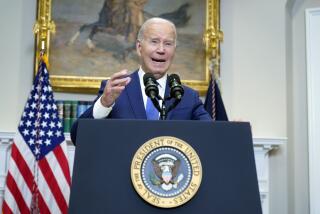Consensus for Fairness
- Share via
An extraordinary bipartisan consensus has developed in support of extending a presidential order requiring companies that do business with the government to promote equal employment opportunity. A majority of the Reagan Cabinet, led by Secretary of Labor William E. Brock III, is for it. The Republican and Democratic leaders of the Senate and the House are for it. A substantial majority of the Republican-controlled Senate is for it. The National Assn. of Manufacturers and other business leaders are for it.
But Atty. Gen. Edwin Meese III and Asst. Atty. Gen. William Bradford Reynolds are not. As a result, the battle to protect affirmative-action programs will never end until President Reagan stops the intramural skirmishing within his own Administration and indicates that he, like four Presidents before him, will support the executive order as is.
Meese and Reynolds want to change the 20-year-old order, ostensibly to ensure that nothing in it allows the use of numerical quotas in hiring and promoting women and members of minorities. But the regulations that spell out how the executive order is to be applied already specifically preclude the use of quotas. Recent Labor Department studies show that the goals and timetables called for in the executive order have not led to quotas.
Goals and timetables have, however, led to “dramatic progress . . . in incorporating talented minorities and women into our work force,” said Alexander B. Trowbridge, president of the National Assn. of Manufacturers, in a letter to the President. NAM wants more flexibility given to employers as they comply with the order, but the organization supports that order because it “has benefited our country and should be continued to ensure the continued participation of all segments of our society in our nation’s economy.”
Recently an important business voice was added in support of the executive order--that of the New York Chamber of Commerce and Industry, the nation’s oldest. “New York companies have been using goals and timetables both as evidentiary tools and as measures to evaluate their progress,” chamber president Ned Cabot said. “While opposed to government-imposed quotas, we consider goals and timetables a measure of progress that corporations use to evaluate all aspects of their business.” He urged the federal government to continue to play a leadership role in this field.
Affirmative action through Executive Order 11246 has proved to be one of the nation’s most effective civil-rights programs. Even without such broad support, there would be no reason to change it now.
More to Read
Inside the business of entertainment
The Wide Shot brings you news, analysis and insights on everything from streaming wars to production — and what it all means for the future.
You may occasionally receive promotional content from the Los Angeles Times.










